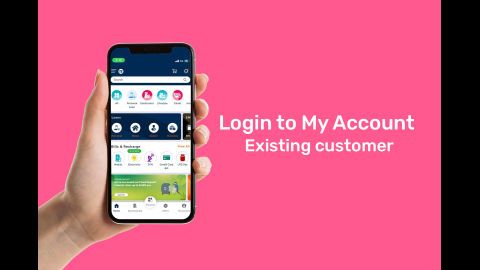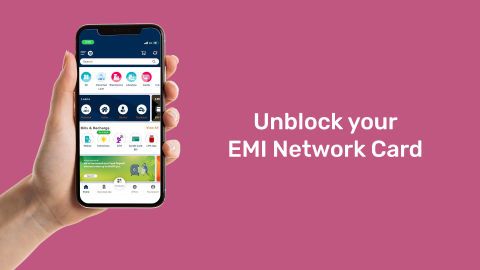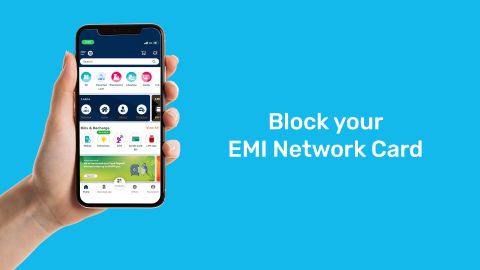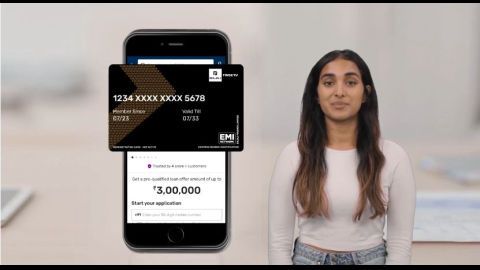Picture this scenario - Mr. X goes to a bank. Here he pretends to be Mr. Y. He produces some fake documents to help his impersonation and gains access to Mr. Y’s funds. This is a crime and is punishable by law, right?
Virtual identity theft is just as serious a crime and it can be just as damaging to you financially. This makes it very important that we stay aware and protected, particularly since digital transactions are on the rise and so are cases of identity theft. Let’s look at how to stay safe from identity theft.
Awareness is power
By now, most of us who use credit/debit cards, online investment, or banking accounts understand what phishing attempts are. We have also learned to safeguard ourselves by not sharing passwords, OTPs, and confidential codes. Identity theft, however, can be more difficult to understand and prevent. A ruthless hacker can steal your identity in many ways. Your discarded paper bank statements or credit card bills, your information from promotional forms that you fill in, data records that can be breached by virus attacks or malware, unsecured data sent over unsecured wireless networks – this is how your identity may be stolen.
Signs of identity theft
One sign of identity theft is that you no longer receive credit card bills or bank account statements in your email or through regular mail.
A sudden drop in credit score without any default or significant credit-related activity from your end.
Withdrawals from your bank account or charges on your credit card that you cannot identify. These could be transactions that you have not made.
Being denied a loan or credit card application on the basis of a poor credit score when you know that you have a good credit track record.
Receiving calls from debt collectors when you have not taken any loans.
Your phone SIM card suddenly stops functioning without any warning.
Identity theft is preventable
Identity theft may seem very daunting and scary but it can be prevented. Here’s what you can do –
Always keep an eye on your credit score, credit card statements, investment, and bank statements. Check the transactions such as withdrawals and expenses.
Keep your email and phone number updated with your bank and your investment partners.
Do not disclose sensitive information such as your credit card number, bank account number, PAN number, etc. on promotional forms.
It is a prudent idea to keep a separate email account for your bank, investment, and credit card transactions and one for all other purposes.
If your SIM card does not work, report immediately to your service provider. If you lose your phone, get the SIM blocked immediately.
Ensure you maintain different PINs and passwords for all your financial accounts.
Keep yourself updated with the awareness literature published by various banks and NBFCs such as Bajaj Finserv.
What to do if your identity is stolen?
Immediately report the incident to your bank or credit card company or financial service provider.
Lodge an FIR with the local police and report the identity theft to the National Cyber Crime Reporting Portal- https://cybercrime.gov.in/
Savdhaan Rahein. Safe Rahein.
Read more:
Frequently asked questions
Block/Unblock
Card Limit
Fees and Charges
Other
Your Insta EMI Card could be blocked in line with the credit policies of Bajaj Finance Limited. There are several factors that determine this, such as:
- If you do not maintain a good credit score.
- If you fail to repay your due EMIs or your EMI bounces.
- Your card can also be blocked if your payment record is inconsistent.
- If we observe any suspicious or fraudulent activities on your card, we will block it for security purposes.
As a quarterly practice, we review the pre-approved offers available for our customers and make changes if needed. This gets communicated to you on your registered mobile number through an SMS.
If we have blocked your card as per our credit policy, you cannot unblock it at your end. However, you can view the reason for this and the criteria to unblock it. To do so, please click here.
You can easily check the status of your Bajaj Finserv Insta EMI Card on the Bajaj Finserv app and website. To view the status of your Insta EMI Card follow the below-mentioned steps:
- Go to Service section on the home page
- Click on view all under ‘Your Relations’
- Select the EMI Card for which you wish to view the details
- You will be able to view your card status
To enjoy uninterrupted Insta EMI Card benefits, ensure that your EMIs are paid on time and maintain a good credit score. Tip: Your credit score is based on overall credit and credit payment history across different loan types and credit institutions over a period of time.
The pre-approved loan offer amount on your Bajaj Finserv Insta EMI Card is subject to change. These changes are governed by Bajaj Finance Limited. There are several factors that determine the card loan offer amount reduction. Some of these include:
- Credit score: If you have a low credit score, the pre-approved loan offer amount can be reduced.
- Repayment history: Your repayment history also affects the loan offer amount of your card.
- Loan frequency: The frequency of loans availed by you using the Bajaj Finserv Insta EMI Card also affects your card loan offer amount.
We review the pre-approved card loan offer amount available to our customers periodically and make changes (either increase or decrease) if needed. These changes are communicated to you on your registered mobile number through an SMS.
If you have an Insta EMI Card but did not make any purchase in the last one year, you will need to pay annual charges. However, if you have bought at least one product with your Insta EMI Card in the preceding year, you’ll find that this charge is waived off.
For example, if the EMI Network Card is issued in Feb 2019 (referred to as "Member Since" on the EMI Network Card) the date for payment of the annual fee will be March 2020 (if there has been no loan booked from Feb 2019 to March 2020).
You don’t have to pay any additional or annual fee to keep your Insta EMI Card active. Even if you have not used the card for a long time, your card will remain active until the end of the validity period (i.e. the 'Valid Till' date) mentioned on your card.
For security reasons, it’s recommended that only the cardholder use his/ her Bajaj Finserv Insta EMI Card. Loans taken against your card are your responsibility and you’ll be held liable if there’s delay in payments or default.
While we used to issue physical EMI Network Card till a few years ago, the new Insta EMI Card is a virtual-only card. It packs in all the features of the physical card without the need to carry it around. You only need your Insta EMI Card number, and the OTP sent to your registered mobile number to complete a purchase.
You can find your Insta EMI Card number on the Bajaj Finserv app or by signing-in into Service Portal.
While the EMI Network Card is now a virtual-only card, you can still use your physical card to make transactions. You can use this card for shopping on Bajaj Mall, other e-commerce destinations, and at our partner stores. Visit our customer portal – My Account to check details of your existing card.














 Personal Loan
Personal Loan Check Eligibility
Check Eligibility Salaried Personal Loan
Salaried Personal Loan EMI Calculator
EMI Calculator Account Aggregator
Account Aggregator
 Deals starting @99
Deals starting @99 Min. 50% off
Min. 50% off
 Bajaj Pay
Bajaj Pay Wallet to Bank
Wallet to Bank
 Smartphones
Smartphones Led TVs
Led TVs Air Conditioner
Air Conditioner Refrigerators
Refrigerators Air Coolers
Air Coolers Laptops
Laptops Washing Machines
Washing Machines Savings Offer
Savings Offer Easy EMI Loan
Easy EMI Loan
 Loan Against Shares
Loan Against Shares Loan Against Mutual Funds
Loan Against Mutual Funds Loan Against Insurance Policy
Loan Against Insurance Policy ESOP Financing
ESOP Financing Easy EMI Loan
Easy EMI Loan Two-wheeler Loan
Two-wheeler Loan Loan for Lawyer
Loan for Lawyer Industrial Equipment Finance
Industrial Equipment Finance Industrial Equipment Balance Transfer
Industrial Equipment Balance Transfer Industrial Equipment Refinance
Industrial Equipment Refinance Personal Loan Branch Locator
Personal Loan Branch Locator Used Tractor Loan
Used Tractor Loan Loan Against Tractor
Loan Against Tractor Tractor Loan Balance Transfer
Tractor Loan Balance Transfer Flexi
Flexi View All
View All
 Two-wheeler Loan
Two-wheeler Loan Bike
Bike Commuter Bike
Commuter Bike Sports Bike
Sports Bike Tourer Bike
Tourer Bike Cruiser Bike
Cruiser Bike Adventure Bike
Adventure Bike Scooter
Scooter Electric Vehicle
Electric Vehicle Best Sellers
Best Sellers Popular Brands
Popular Brands

 Open Demat Account
Open Demat Account Trading Account
Trading Account Margin Trading Facility
Margin Trading Facility Share Market
Share Market Invest in IPO
Invest in IPO All stocks
All stocks Top gainers
Top gainers Top losers
Top losers 52 week high
52 week high 52 week low
52 week low Loan against shares
Loan against shares
 Home Loan
Home Loan Transfer your existing Home loan
Transfer your existing Home loan Loan against Property
Loan against Property Home Loan for Salaried
Home Loan for Salaried Home loan for self employed
Home loan for self employed Loan Against Property Balance Transfer
Loan Against Property Balance Transfer Home Loan EMI Calculator
Home Loan EMI Calculator Home Loan eligibility calculator
Home Loan eligibility calculator Home Loan balance transfer
Home Loan balance transfer View All
View All
 Term Life Insurance
Term Life Insurance ULIP Plan
ULIP Plan Savings Plan
Savings Plan Family Insurance
Family Insurance Senior Citizen Health Insurance
Senior Citizen Health Insurance Critical Illness Insurance
Critical Illness Insurance Child Health Insurance
Child Health Insurance Pregnancy and Maternity Health Insurance
Pregnancy and Maternity Health Insurance Individual Health Insurance
Individual Health Insurance Low Income Health Insurance
Low Income Health Insurance Student Health Insurance
Student Health Insurance Group Health Insurance
Group Health Insurance Retirement Plans
Retirement Plans Child Plans
Child Plans Investment Plans
Investment Plans
 Business Loan
Business Loan Secured Business Loan
Secured Business Loan Loan against property
Loan against property Loans against property balance transfer
Loans against property balance transfer Loan against shares
Loan against shares Home Loan
Home Loan Loans against mutual funds
Loans against mutual funds Loan against bonds
Loan against bonds Loan against insurance policy
Loan against insurance policy
 Apply for Gold Loan
Apply for Gold Loan Transfer your Gold Loan with Us
Transfer your Gold Loan with Us Gold Loan Branch Locator
Gold Loan Branch Locator
 ULIP Plan
ULIP Plan Savings Plan
Savings Plan Retirement Plans
Retirement Plans Child Plans
Child Plans Free Demat Account
Free Demat Account Invest in Stocks
Invest in Stocks Invest in IPO
Invest in IPO Margin Trading Facility
Margin Trading Facility Fixed Deposit Branch Locator
Fixed Deposit Branch Locator
 New Car Loan
New Car Loan Used Car Loan
Used Car Loan Loan Against Car
Loan Against Car Car Loan Balance Transfer and Top-up
Car Loan Balance Transfer and Top-up My Garage
My Garage
 Get Bajaj Prime
Get Bajaj Prime
 Mobiles on EMI
Mobiles on EMI Electronics on EMI Offer
Electronics on EMI Offer  Iphone on EMI
Iphone on EMI LED TV on EMI
LED TV on EMI Refrigerator on EMI
Refrigerator on EMI Laptop on EMI
Laptop on EMI Kitchen appliances on EMI
Kitchen appliances on EMI Washing machines
Washing machines
 Personal Loan EMI Calculator
Personal Loan EMI Calculator Personal Loan Eligibility Calculator
Personal Loan Eligibility Calculator Home Loan EMI Calculator
Home Loan EMI Calculator Home Loan Eligibility Calculator
Home Loan Eligibility Calculator Good & Service Tax (GST) Calculator
Good & Service Tax (GST) Calculator Flexi Day Wise Interest Calculator
Flexi Day Wise Interest Calculator Flexi Transaction Calculator
Flexi Transaction Calculator Secured Business Loan Eligibility Calculator
Secured Business Loan Eligibility Calculator Fixed Deposits Interest Calculator
Fixed Deposits Interest Calculator Two wheeler Loan EMI Calculator
Two wheeler Loan EMI Calculator New Car Loan EMI Calculator
New Car Loan EMI Calculator Used Car Loan EMI Calculator
Used Car Loan EMI Calculator All Calculator
All Calculator Used Tractor Loan EMI Calculator
Used Tractor Loan EMI Calculator
 Hot Deals
Hot Deals Clearance Sale
Clearance Sale Kitchen Appliances
Kitchen Appliances Tyres
Tyres Camera & Accessories
Camera & Accessories Mattresses
Mattresses Furniture
Furniture Watches
Watches Music & Audio
Music & Audio Cycles
Cycles Mixer & Grinder
Mixer & Grinder Luggage & Travel
Luggage & Travel Fitness Equipment
Fitness Equipment Fans
Fans
 Personal Loan for Doctors
Personal Loan for Doctors Business loan for Doctors
Business loan for Doctors Home Loan
Home Loan Secured Business Loan
Secured Business Loan Loan against property
Loan against property Secured Business Loan Balance Transfer
Secured Business Loan Balance Transfer Loan against share
Loan against share Gold Loan
Gold Loan Medical Equipment Finance
Medical Equipment Finance
 Smart Hub
Smart Hub ITR Service
ITR Service Digi Sarkar
Digi Sarkar
 Savings Offer
Savings Offer Easy EMI
Easy EMI Offer World
Offer World 1 EMI OFF
1 EMI OFF New Launches
New Launches Zero Down Payment
Zero Down Payment Clearance Sale
Clearance Sale Bajaj Mall Sale
Bajaj Mall Sale
 Mobiles under ₹20,000
Mobiles under ₹20,000 Mobiles under ₹25,000
Mobiles under ₹25,000 Mobiles under ₹30,000
Mobiles under ₹30,000 Mobiles under ₹35,000
Mobiles under ₹35,000 Mobiles under ₹40,000
Mobiles under ₹40,000 Mobiles under ₹50,000
Mobiles under ₹50,000
 Articles
Articles
 Overdue Payments
Overdue Payments Other Payments
Other Payments
 Document Center
Document Center Bank details & Documents
Bank details & Documents Tax Invoice Certificate
Tax Invoice Certificate
 Do Not Call Service
Do Not Call Service
 Hamara Mall Orders
Hamara Mall Orders Your Orders
Your Orders

 Fixed Deposit (IFA) Partner
Fixed Deposit (IFA) Partner Loan (DSA) Partner
Loan (DSA) Partner Debt Management Partner
Debt Management Partner EMI Network Partner
EMI Network Partner Became a Merchant
Became a Merchant Partner Sign-in
Partner Sign-in
 Trade directly with your Demat A/c
Trade directly with your Demat A/c ITR
ITR My Garage
My Garage
 Live Videos - Beta
Live Videos - Beta
 Savings Offer
Savings Offer Smartphones
Smartphones LED TVs
LED TVs Air Conditioners
Air Conditioners Refrigerators
Refrigerators Air Coolers
Air Coolers Laptops
Laptops Washing Machines
Washing Machines Water Purifiers
Water Purifiers Tablets
Tablets Kitchen Appliances
Kitchen Appliances Mattresses
Mattresses Furniture
Furniture Music and Audio
Music and Audio Cameras & Accessories
Cameras & Accessories Cycle
Cycle Watches
Watches Tyres
Tyres Luggage & Travel
Luggage & Travel Fitness Equipment
Fitness Equipment Tractor
Tractor Easy EMI Loan
Easy EMI Loan
 vivo Mobiles
vivo Mobiles OPPO Mobiles
OPPO Mobiles Xiaomi Mobiles
Xiaomi Mobiles Sony LED TVs
Sony LED TVs Samsung LED TVs
Samsung LED TVs LG LED TVs
LG LED TVs Haier LED TVs
Haier LED TVs Godrej Refrigerators
Godrej Refrigerators Voltas Washing Machines
Voltas Washing Machines
 New Tractor Loan
New Tractor Loan Used Tractor Loan
Used Tractor Loan Loan Against Tractor
Loan Against Tractor Tractor Loan Balance Transfer
Tractor Loan Balance Transfer
 New Car Loan
New Car Loan New Cars Under ₹10 Lakh
New Cars Under ₹10 Lakh New Cars – ₹10–₹15 Lakh
New Cars – ₹10–₹15 Lakh New Cars – ₹15–₹20 Lakh
New Cars – ₹15–₹20 Lakh New Cars – ₹20–₹25 Lakh
New Cars – ₹20–₹25 Lakh New Car Brands
New Car Brands Petrol – New Cars
Petrol – New Cars Diesel – New Cars
Diesel – New Cars Electric – New Cars
Electric – New Cars CNG – New Cars
CNG – New Cars Hybrid – New Cars
Hybrid – New Cars











